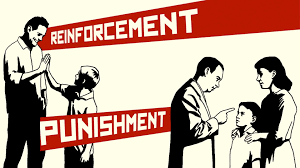Discipline is important for effective learning to place and after today’s lecture I felt I’d like to know more of what it can mean to me as a practitioner. Operant conditioning is a learning process in which behavioural responses are based on consequences. There are two types of operant conditioning that can be used to modify behaviour: reinforcements are used positively and negatively to increase behaviour and punishments are used positively and negatively to decrease behaviour.
From early in a child’s life they recognise their behaviour is instrumental to an outcome. Positive reinforcement comes in many forms and I believe is the most effective is verbal praise: “Well done Hannah, you are sitting beautifully”. Undoubtedly children strive to please and will take great pleasure in being positively rewarded, which is likely to continue and other children are likely to emulate this exemplary behaviour.
In today’s lecture, I was slightly confused with the terms negative reinforcement and punishment. I understood that negative reinforcement was to increase desired behaviour however explaining this with terms such as aversive stimulus was confusing. After doing some reading, my understanding of negative reinforcement is that in order to increase desired behaviour aversive (unpleasant event) stimulus must be discouraged or eliminated e.g. removing a negative distraction to improve concentration. Positive punishment is when you present an aversive stimulus to decrease behaviour e.g. a child is reprimanded for behaving in an adverse way. Negative punishment is taking away a desired item after behaviour occurs in order to decrease future responses. As a result, in theory, children will omit behaviour that has an effect on the environment around them. Carrie mentioned punishment for undesirable behaviour can lead to other aversive behaviours so I feel consistently using, but not overusing positive reinforcements, should reduce the need to use punishments.
It is evident this theory is built on limited range of phenomena as it doesn’t take account of complexities such as meaning, understanding or memory. It doesn’t explain why behaviour doesn’t decrease and that some children are wise to operant conditioning, in the sense that they will behave in a certain way to get what they want then revert back to their original behaviour.


